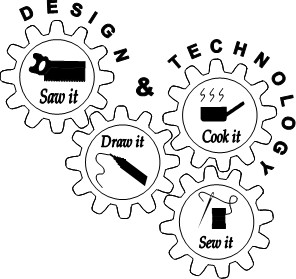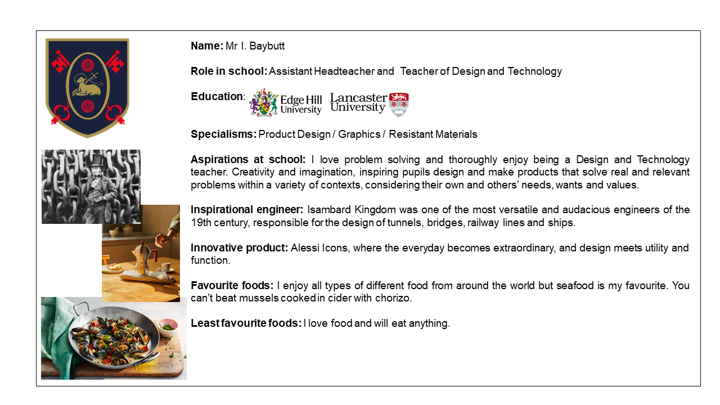Subject: Design and Technology

CURRICULUM INTENT
Design and Technology is a creative and practical subject that encourages students to become independent learners who can identify, analyse and apply knowledge to solve problems. It teaches students how to take risks and try new things and so become more resourceful, innovative, enterprising and capable. Students develop a critical understanding of the impact of design and technology on daily life and the wider world and how the use of different materials can and do have an impact on society. Additionally, it provides excellent opportunities for students to develop and apply value judgements of an aesthetic, economic, moral, social, and technical nature both in their own designing and when evaluating the work of others.
The departments motto Saw It – Draw It – Sew It – Cook It actively promotes the four distinct subject areas of Product Design, Resistant Materials, Textiles and Food and Nutrition that are taught for 2 hours a week throughout Key Stage 3. We focus on providing engaging lessons that capture students’ imaginations and get them thinking about how to solve real world problems and equip students with designing and making skills in preparation for Key Stage 4 and for use in life beyond school.
“He has filled him with the Spirit of God, with wisdom, with understanding, with knowledge and with all kinds of skills to make artistic designs for work in gold, silver and bronze, to cut and set stones, to work in wood and to engage in all kinds of artistic crafts.”
Exodus 35: 31-33
IMPLEMENTATION
Within the three areas of Design and Technology at Key Stage Three, all lessons are tailored in supporting the needs and ability levels of the pupils. At Key Stage Four pupils have the opportunity to specialise in a particular area of Design and Technology: Textiles, Graphic Products, Resistant Materials and Food Preparation & Nutrition. All areas are taught by specialist teachers and are taught in subject specific rooms.
Programmes of Study
Year 7
Textiles
Health and safety, making materials and fibre investigation.
Product Design
Drawing skills, introduction to computer aided design, Health and safety and developing independence and accuracy with workshop tools.
Food and Nutrition
Hygiene and Safety, healthy eating guidelines, macronutrient and micronutrients, Introduction to food preparation and cooking skills.
Year 8
Textiles
Colour application, investigation into other cultures and creating a 3D made product.
Product Design
Mechanisms and forces, computer aided manufacture and user centred design. Embedding skills and knowledge in workshop machinery to produce three dimensional products.
Food and Nutrition
Multicultural cuisines, dough and sauce investigations and food provenance.
Year 9
Textiles
Construction in Fabric Project, construction of a product from sustainable sources.
Product Design
Functionality, aesthetics, ergonomics and anthropometrics. Utilising workshop tools and machinery to produce three dimensional products.
Food and Nutrition
Food science and investigation, composite meals and nutrition.
Click here to view the Year 9 Options information for Design and Technology.
Click here to view the Year 9 Options information for Food Preparation and Nutrition.
Year 10
At Key Stage 4, pupils have the opportunity to specialise in a particular area of Design and Technology: Textiles, Graphic Products, Resistant Materials and Food Preparation & Nutrition.
Design and Technology; Textiles, Graphic Products and Resistant Material specialisms
Pupils will study core technical principles as well as specialist subject specific practical projects and theory during this year, which include;
Core technical principles - to extend the pupils knowledge and understanding of the subject and gain a breadth of core technical knowledge and understanding. This will help to make informed decisions when designing.
Specialist technical principles – pupils should develop an in-depth knowledge and understanding of specialist technical principles including: selecting materials and components – forces and stresses – ecological and social footprint – sources and origins - selection of materials or components - using and working with materials - stock forms, types and sizes - scales of production - specialist techniques and processes - surface treatments and finishes.
Designing and Making Principles - Students should know and understand that all design and technology activities take place within a wide range of contexts. They should also understand how the prototypes they develop must satisfy wants or needs and be fit for their intended use. For example, the home, school, work or leisure. They will need to demonstrate and apply knowledge and understanding of designing and making principles in the completion of a design and make piece of coursework.
Food Preparation and Nutrition
Pupils can also opt for GCSE Food and Nutrition. The course equips students with the knowledge, understanding and skills required to cook and apply the principles of food science, nutrition and healthy eating. It encourages learners to cook, enables them to make informed decisions about food and nutrition and allows them to acquire knowledge in order to be able to feed themselves and others affordably and nutritiously, now and later in life.
During year 10 pupils will complete a series of written projects as well as food practical projects that concentrate on enhancing pupils’ skills and understanding in twelve keys areas of assessment;
General Practical Skills
Knife Skills
Preparing Fruit & Veg
Cooker Skills
Using Equipment
Cooking Methods
Prepare Combine Shape
Sauces
Tenderised & Marinate
Dough
Raising Agents
Setting Mixtures
Year 11
Design and Technology; Textiles, Graphic Products and Resistant Material specialisms
Pupils will be completing the NEA (Non-Examined Assessment) element of their course that is worth 50% of their overall level. This consists of a project that explores one of the three contextual challenges set by the examination board Eduqas.
Pupils will also sit their GSCE examination paper that is worth 50% of the overall level.
IMPACT
Marking and Assessment
Knowledge and attainment in Design & Technology and Food & Nutrition is based upon a 5-year curriculum.
Students are assessed in a variety of ways based upon the mastery principles of designing, making evaluating and technical knowledge. Each year group has a broad range of skills that challenge all abilities and allow for incremental progress through the year and through each unit of work. Testing is routinely carried out at the end of units and each year group has an internal preparation examination.
Examinations
GCSE examination board: Eduqas - Design & Technology
GCSE examination board: AQA – Food Preparation & Nutrition
In year 11, the pupils complete a None Examined Assessment, which is worth 50% of the final grade. Pupils also sit an end of year examination again worth 50% of the final grade.
Revision Guides / Resources
Design & Technology –
CGP GCSE Design and Technology revision guide
CGP GCSE Design and Technology exam practice work booklet
PG Online resources
Food Preparation & Nutrition –
CGP Food Preparation & Nutrition revision guide
CGP Food Preparation & Nutrition exam practice work booklet
AQA – Digital resources, Illuminate textbook
Seneca online resources
Staff Details
Mr G. Taylor - Head of Technology
Mrs A. Smith - Teacher of Food Technology & Textiles
Mr I. Baybutt - Assistant Headteacher
Miss C. Barker - Teacher of Design & Technology
Ms E. Bridge - Teacher of Food Technology
Careers and Progression
Design skills and the ability to visualise new ideas can be useful in many job families such as marketing, sales and advertising, arts crafts and design, broadcast media and performing arts, journalism and publishing, construction, as well as engineering and manufacturing to name but a few.
Design and Technology Curriculum Plans
Click on an image below and scroll through using the arrows.
